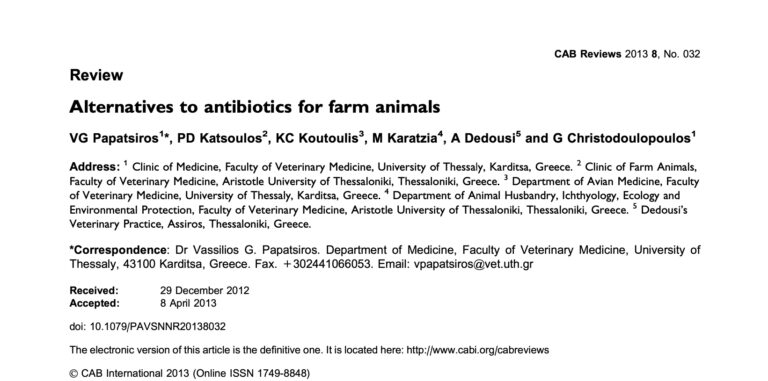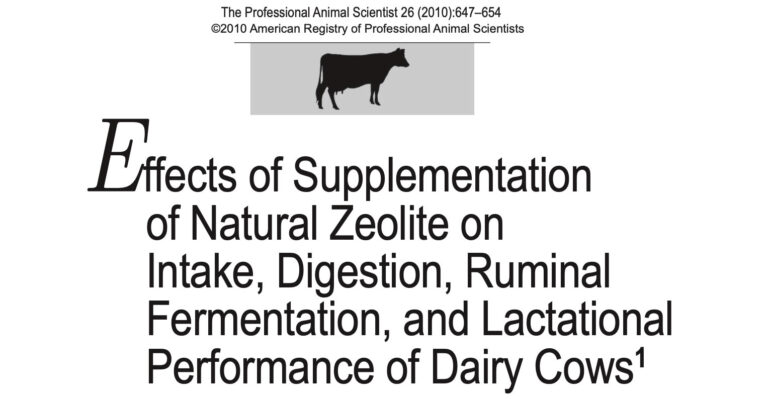Zeolite in livestock farming
Zeolite in livestock farming is used as an additive in the animals’ rations and in their living space. Passing through the digestive system, zeolite cleanses the animal’s body of toxins, heavy metals and free radicals. This contributes to their good health but also to increasing the quality of products such as meat, milk and eggs. Zeolite, in the animal living area, is an excellent environmental regulator, managing moisture and absorbing unpleasant odours.
Zeolite in animal feed
In exactly the same way that zeolite affects the human body, it also affects the animal body. Primarily zeolite is used in animal husbandry as a nutritional supplement that cleanses the animal’s body of toxins, heavy metals and free radicals. This contributes to their good health but also to increasing the quality of products such as meat, milk and eggs. [1]
In a 2016 study, it was shown that the dietary administration of clinoptilolith, in powder form, at a rate of 200 grams per cow per day can effectively reduce the concentration of aflatoxin AFM1 in the milk of dairy cows. At the same time it can be used as a preventive measure to improve the risks associated with the presence of aflatoxins in milk, which can cause human poisoning. [2]
In a study with chickens, zeolite was shown to be able to absorb ochratoxin A. [3]
In 2012, a study on the dietary inclusion of urea-soaked zeolite as a slow-release urea (SRU) agent was conducted to reveal its effect on ruminal fermentation characteristics in lambs. Zeolite has been shown to be capable of reducing ammonia in myricase, pH, acetate to propionate ratio, methane and maintaining low plasma urea within the normal range. [4]
Zeolite and the European Union Directive
The European Union, in accordance with Directive 70/524/EEC (Commission Regulation (EC) No 1810/2005), has officially authorised the use of clinoptilolite of sedimentary origin as a binding and anti-caking additive in feedingstuffs for poultry, cattle, pigs and salmon. [5]
Table of natural zeolite effect in animal nutrition
| Impact | Rate of increase |
|---|---|
| Cows – Increase in milk production | 17% |
| Poultry – increasing nitrogen in manure | 6% |
| Poultry – Reducing ammonia loss | 55% |
| Poultry – Increased weight and spawning | 7% |
The use of natural zeolite in animal husbandry can have the following effects:
- It protects animals from intestinal diseases by fighting diarrhoea.
- Reduces food consumption.
- Reduces the medication of animals.
- It reduces the mortality of young animals and contributes to their growth.
- It binds the ammonia produced during the digestion of food, while at the same time it releases potassium that regulates the acidity of the stomach which facilitates the absorption of minerals and nutrients.
- It binds and removes toxins and allergens from food through the digestive tract.
- Improves the immune system of animals.
- It contributes to increased milk production and meat quality. An increase of 17% has been observed in the milk production of cows
- It helps to control odours, mainly ammonia and hydrogen sulphide in feed preservation and storage areas of livestock farms.
- As a means of improving the living conditions of the animals in the rearing chambers.
- Poultry show an increase in laying and a 7% increase in weight.
- Raising goats at 2.5% in their ration resulted in an increase in weight, births in triplets and quadruplets and a significant increase in fat content in their milk.
Zeolite in the animal habitat
Along with nutrition, zeolite is also used in the living area of animals as an excellent environmental regulator, managing moisture and absorbing unpleasant odors.
Laboratory studies have verified that the addition of clinoptilolite to a mixture of fresh pig and cattle manure, respectively, provides an effective means of trapping ammonia nitrogen during composting and thus reducing ammonia emissions. Given the high adsorption of ammonium and ammonia from zeolite, some researchers have focused their studies on evaluating the effect of dietary zeolite use on environmental stressors, such as aerial ammonia, that are recognized to contribute to persistent health problems under intensive farming conditions. It was shown that the use of zeolite in a basal diet of finishing pigs at 5% incorporation rate had a favourable deodorization effect and a reduction of aerial ammonia concentration by 28.5%. In addition, studies in growing pigs found the effectiveness of the same dietary regime in reducing nitrogen and ammonia emission by 21% [1]
A Greek study in 2015 observed that the addition of clinoptilolith in cow rations could mitigate the effects of nitrate on protein metabolism and glucose utilisation. Nitrates are ingested by prolonged consumption of water with elevated levels of them. [6]
In the wider area of Petrota new Orestiada, where the natural zeolite is in abundance, many stables and other buildings have zeolite as building material. Due to its antifungal status, it also protects the breasts of animals from diseases, improving quality and increasing the amount of milk produced. Because of the absorption of ammonia and other harmful substances, the odorless manure can then be used as fertilizer.
In pets, as well as in aquariums, the ability of zeolite to bind ammonia and odours is used as an alternative to conventional soil for their physical needs.
Recent news and publications on zeolite in livestock farming

Zeolite, what is it, what does it do and where is it used?
Zeolite is a natural, inert, clay-silicate rock, which generally cleans and manages the environment in which it is found. Zeolite has a unique combination of…

Alternatives to antibiotics for farm animals
New strategies and commercial products must be developed to improve animal health and performance, based on their safety, efficacy and cost-effectiveness. The aim of this study is to summarize the beneficial effects of currently used alternatives to in-feed antibiotics, i.e. probiotics, prebiotics, organic acids, phytogenic compound sand zeolites on health and growth performance in farm animals (swine, poultry and ruminants)

Effects of Supplementation of Natural Zeolite on Intake, Digestion, Ruminal Fermentation, and Lactational Performance of Dairy Cows
Effects of Supplementation of Natural Zeolite on Intake, Digestion, Ruminal Fermentation, and Lactational Performance of Dairy Cows
Lecture by Professor Nikos Lygeros on the use of zeolite in animal husbandry
References
- [1] The role of natural and synthetic zeolites as feed additives on the prevention and/or the treatment of certain farm animal diseases: A review
- [2] In-field evaluation of clinoptilolite feeding efficacy on the reduction of milk aflatoxin M1 concentration in dairy cattle
- [3] In vitro and in vivo protective effects of three mycotoxin adsorbents against ochratoxin A in broiler chickens
- [4] Zeolite improves the myricase characteristics of lambs
- [5] EXECUTIVE REGULATION (EU) No. 651/2013 OF THE COMMISSION OF THE EUROPEAN UNION
- [6] Effects of prolonged consumption of water with elevated nitrate levels on certain metabolic parameters of dairy cattle and use of clinoptilolite for their amelioration